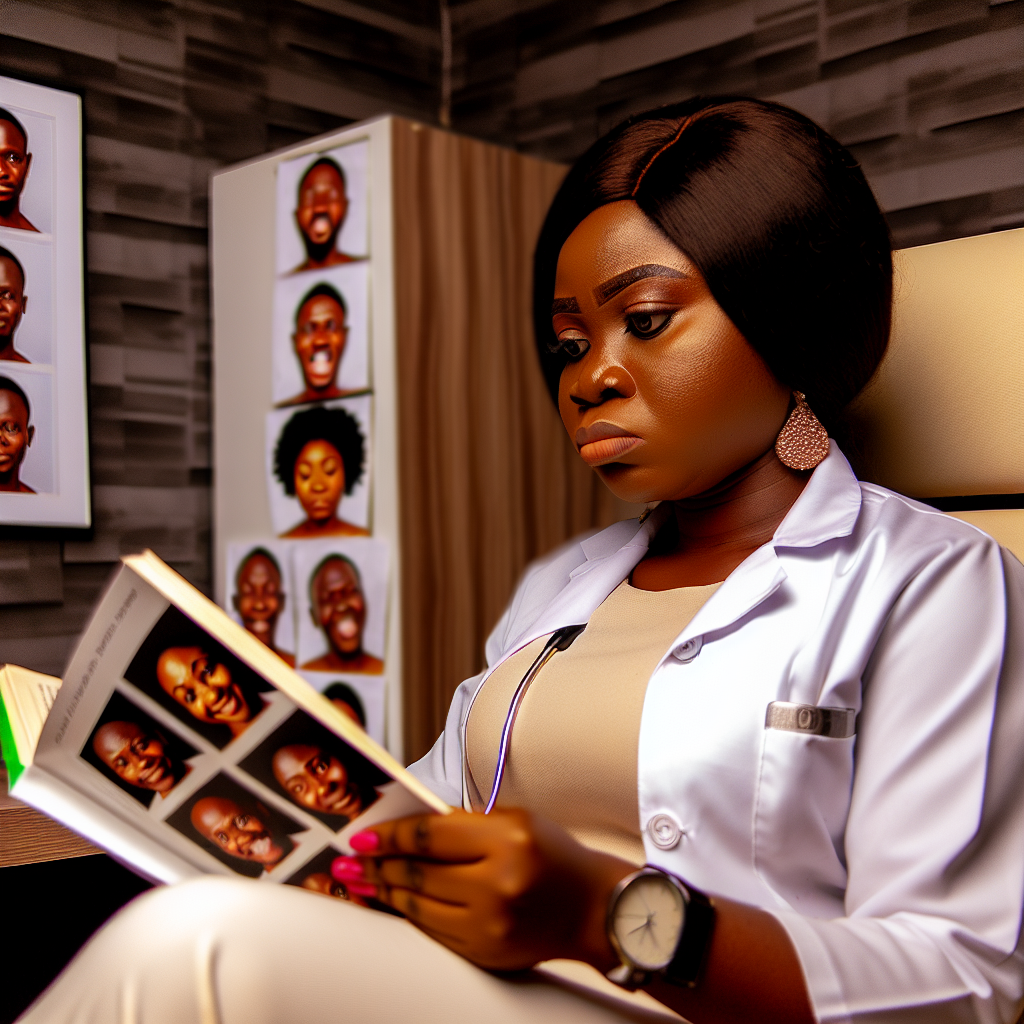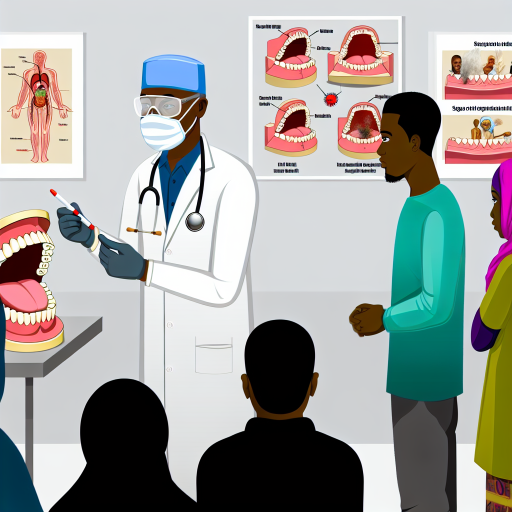Introduction
Soft skills are crucial for medical practitioners as they enhance patient communication and teamwork.
Nigerian medical practitioners face challenges in developing soft skills due to inadequate training programs.
Understanding the importance of soft skills:
- Soft skills complement technical skills in the medical field by enhancing communication and interpersonal relationships.
- Examples of soft skills needed for effective patient care and communication include empathy, active listening, and cultural competence.
Soft skills are often undervalued in the medical profession, where technical knowledge and expertise are highly emphasized.
However, these skills are essential for building rapport with patients, collaborating effectively with colleagues, and navigating complex healthcare environments.
In Nigeria, where healthcare systems can be challenging and resources limited, the development of soft skills among medical practitioners is crucial for delivering high-quality care and improving patient outcomes.
The role of soft skills in patient care:
Soft skills play a critical role in patient care by enabling healthcare providers to establish trust, communicate effectively, and address the emotional needs of patients.
For instance, empathy allows medical practitioners to connect with patients on a deeper level, understand their concerns, and provide compassionate care.
Active listening is another important skill that helps healthcare providers fully comprehend patients’ needs, concerns, and preferences, leading to more personalized and patient-centered care.
Cultural competence is also vital in a diverse country like Nigeria, where healthcare providers must navigate cultural differences, language barriers, and social determinants of health to deliver equitable and inclusive care.
Moreover, soft skills are essential for building strong doctor-patient relationships, enhancing patient satisfaction, and ultimately improving health outcomes.
When patients feel heard, understood, and respected by their healthcare providers, they are more likely to adhere to treatment plans, follow medical advice, and engage in preventive care.
Effective communication, empathy, and interpersonal skills also contribute to a positive patient experience, which can lead to better health outcomes, increased patient trust, and improved patient loyalty.
Examples of soft skills for effective communication:
- Empathy: Understanding and sharing patients’ feelings and experiences to provide compassionate care.
- Active listening: Fully engaging with patients, focusing on their words, and providing thoughtful responses.
- Cultural competence: Respecting and responding to the cultural beliefs, values, and practices of diverse patient populations.
Developing these soft skills requires ongoing training, practice, and reflection by medical practitioners in Nigeria.
Continuous professional development programs, workshops, and simulations can help healthcare providers enhance their communication, empathy, and cultural competence skills.
Role-playing exercises, case studies, and feedback sessions are effective tools for improving soft skills and promoting self-awareness among medical practitioners.
Soft skills are indispensable for Nigerian medical practitioners to deliver compassionate, patient-centered care, foster strong doctor-patient relationships, and navigate diverse healthcare settings effectively.
By investing in the development of soft skills, healthcare providers can enhance the quality of care, improve patient satisfaction, and ultimately contribute to better health outcomes for patients in Nigeria.
Communication skills:
- Importance of clear and effective communication with patients, colleagues, and other healthcare professionals
- Strategies for improving communication skills, such as active listening and empathy
Why are communication skills important for Nigerian medical practitioners?
Effective communication is the foundation of patient care.
It ensures that medical practitioners can understand their patients’ needs and concerns, leading to better diagnosis and treatment.
Clear communication with colleagues and other healthcare professionals is also crucial for teamwork and collaboration in providing comprehensive care.
Improving communication skills:
One of the key strategies for Nigerian medical practitioners to enhance their communication skills is through active listening.
This involves fully concentrating on what the patient is saying, without interrupting or jumping to conclusions.
By actively listening, medical practitioners can build trust with their patients and create a more comfortable environment for open communication.
The role of empathy in communication:
Empathy is another important aspect of effective communication for Nigerian medical practitioners.
It involves understanding and sharing the feelings of patients, which can help in providing compassionate care.
By empathizing with patients, medical practitioners can establish a stronger connection and build rapport, leading to better treatment outcomes.
Implementing communication skills in practice:
Nigerian medical practitioners can incorporate these strategies into their daily practice by actively engaging with patients, asking open-ended questions, and showing empathy during consultations.
Additionally, seeking feedback from patients and peers can help in identifying areas for improvement and further enhancing communication skills.
Importance of Communication Skills in Healthcare
Developing strong communication skills is essential for Nigerian medical practitioners to provide quality care and build trusting relationships with patients and colleagues.
By prioritizing clear and effective communication, medical practitioners can enhance the overall healthcare experience and achieve better outcomes for their patients.
Explore Further: Radiography Program Accreditation in Nigeria
Empathy and Bedside Manner:
When it comes to patient care, empathy plays a crucial role in building rapport and trust between medical practitioners and their patients.
Empathy is the ability to understand and share the feelings of another person, which is essential in providing compassionate care.
Discussion on the Role of Empathy in Patient Care and Building Rapport:
- Empathy is a key component in establishing a strong doctor-patient relationship.
- When patients feel understood and supported, they are more likely to adhere to treatment plans and feel satisfied with their care.
- By listening attentively to patients’ concerns and showing genuine interest in their well-being, medical practitioners can create a safe and trusting environment.
- Empathy helps medical practitioners better understand the needs and preferences of their patients.
- This allows them to tailor their treatment approach accordingly and provide personalized care.
- Building rapport through empathy can lead to improved patient outcomes.
- Patients are more likely to engage in preventive care when they feel valued and respected by their healthcare providers.
- They will adhere to medications and follow up on appointments more consistently.
Tips for Enhancing Bedside Manner and Showing Empathy Towards Patients:
- Practice active listening: Pay close attention to what patients are saying.
- Validate their feelings by acknowledging their concerns and emotions.
- Use non-verbal cues: Maintain eye contact and display open body language.
- Offer reassuring gestures, such as a gentle touch on the shoulder.
- Communicate effectively: Use clear and simple language when explaining medical information.
- Encourage patients to ask questions and express their thoughts.
- Show empathy through actions: Take the time to sit with patients and ask about their well-being.
- Practice cultural competence: Respect patients’ cultural beliefs, values, and traditions.
- Seek feedback: Encourage patients to provide feedback on their care experience and use it to improve your skills.
Developing empathy and enhancing bedside manner are essential skills for Nigerian medical practitioners.
By incorporating these tips into their practice, healthcare professionals can create a compassionate and supportive environment.
This promotes positive health outcomes and patient satisfaction.
Find Out More: Government Programs for Child Dental Health
Teamwork and Collaboration
Teamwork is an essential aspect of healthcare as it involves multiple professionals working together to deliver quality patient care.
Importance of Working Effectively in a Healthcare Team
- Enhances patient outcomes: Collaboration among medical practitioners leads to better outcomes for patients.
- Efficient care delivery: Teamwork ensures that patients receive timely and coordinated care.
- Utilization of diverse skills: Working in a team allows practitioners to leverage each other’s unique skills and expertise.
- Improved communication: Effective teamwork promotes open communication, reducing the risk of errors.
Ways to Improve Teamwork Skills
- Sharing responsibilities: Distributing tasks evenly among team members fosters cooperation and reduces individual stress.
- Respecting colleagues’ opinions: Valuing and considering the input of fellow practitioners promotes a positive work environment.
- Active listening: Paying attention to team members’ perspectives and feedback enhances collaboration and trust.
- Conflict resolution skills: Learning how to address disagreements constructively is crucial for maintaining team harmony.
- Building relationships: Connecting with colleagues on a personal level can strengthen teamwork and enhance morale.
By honing their teamwork and collaboration skills, Nigerian medical practitioners can enhance the quality of care they provide and create a more supportive work environment for themselves and their colleagues.
Gain More Insights: Salary Expectations for Anatomical Pathologists in Nigeria
Transform Your Career with Expert Guidance
Get personalized mentorship consulting that’s tailored to your unique path. Our expert advice is actionable and exclusive.
Get StartedProblem-solving and critical thinking:
Medical practitioners can greatly benefit from strong problem-solving skills.
Whether it’s diagnosing a complex condition or devising a treatment plan, the ability to effectively solve problems is crucial in providing quality patient care.
Techniques for developing critical thinking skills:
- Continuously seek to expand knowledge: Read medical journals, attend conferences, and participate in continuous medical education programs to stay updated on the latest developments in healthcare.
- Utilize evidence-based practice: Base your clinical decisions on research evidence, patient values, and clinical expertise to ensure the best outcomes for your patients.
- Collaborate with colleagues: Discuss complex cases with other healthcare professionals to gain different perspectives and insights that can help in problem-solving and decision-making.
- Practice active listening: Listen attentively to patients, colleagues, and other healthcare professionals to understand their perspectives and gather valuable information for problem-solving.
- Embrace uncertainty: Medicine is not always black and white, and there may be situations where definitive answers are not immediately available. Learn to navigate uncertainty with a calm and rational approach.
By incorporating these techniques into their practice, Nigerian medical practitioners can enhance their critical thinking skills and make well-informed decisions in patient care.
Learn More: Dental Therapist-Patient Relationship in Nigeria

Adaptability and Flexibility
Challenges faced by medical practitioners that require adaptability and flexibility:
- Emergencies and unexpected situations in the hospital.
- New procedures or medical technologies to learn and implement.
- Changes in healthcare policies and regulations.
- Shifts in patient demographics and healthcare needs.
- Dealing with difficult patients or colleagues.
Strategies for staying calm and adaptable in high-pressure situations:
- Practice mindfulness and deep breathing techniques.
- Develop a positive attitude towards change and challenges.
- Seek support from colleagues or supervisors when needed.
- Enhance problem-solving and decision-making skills.
- Stay organized and prioritize tasks effectively.
Adaptability and flexibility are crucial soft skills for Nigerian medical practitioners to navigate the ever-changing healthcare landscape.
Being able to quickly adjust to new situations and challenges is essential for providing quality care to patients and maintaining a successful medical practice.
Time management and organization:
Efficient time management is crucial for Nigerian medical practitioners working in a fast-paced healthcare environment.
Here are some key points to consider:
- Importance of managing time efficiently in a fast-paced healthcare environment
- Tips for prioritizing tasks
- Setting realistic goals
- Maintaining organization in daily routines
Doctors and medical practitioners in Nigeria often face high patient loads and tight schedules.
Efficient time management is essential to ensure that all patients receive timely and quality care.
It is important for medical practitioners to prioritize tasks based on urgency and importance.
This can help them focus on critical issues and prevent tasks from piling up.
Setting realistic goals allows medical practitioners to stay focused and motivated.
By breaking down larger tasks into smaller, achievable goals, they can maintain momentum and track progress.
Organizational skills are essential for medical practitioners to keep track of patient records, appointments, and treatments.
By maintaining a well-organized system, they can minimize errors and enhance patient care.
By implementing effective time management strategies and maintaining organization in their daily routines, Nigerian medical practitioners can improve their productivity, reduce stress, and ultimately enhance patient outcomes.
Importance of Developing Soft Skills for Medical Practitioners
Nigerian medical practitioners must prioritize the development of their soft skills.
This involves honing communication, empathy, and teamwork abilities.
Enhancing these skills can improve patient outcomes and foster professional growth.
Key points discussed in this blog highlight the significance of soft skills in the medical field.
Medical practitioners need to actively work on improving these skills.
This will enable them to provide better patient care.
Nigerian medical practitioners are encouraged to invest time and effort into developing their soft skills.
By doing so, they can build stronger relationships with patients.
Furthermore, they can collaborate effectively with colleagues.
Ultimately, this investment will help them excel in their medical careers.
Additional Resources
Adedotun Ifedayo Abe – Medical Officer – Korle-Bu Teaching Hospital
Chijioke Orji – Medical Officer – Jericho Nursing Home | LinkedIn




